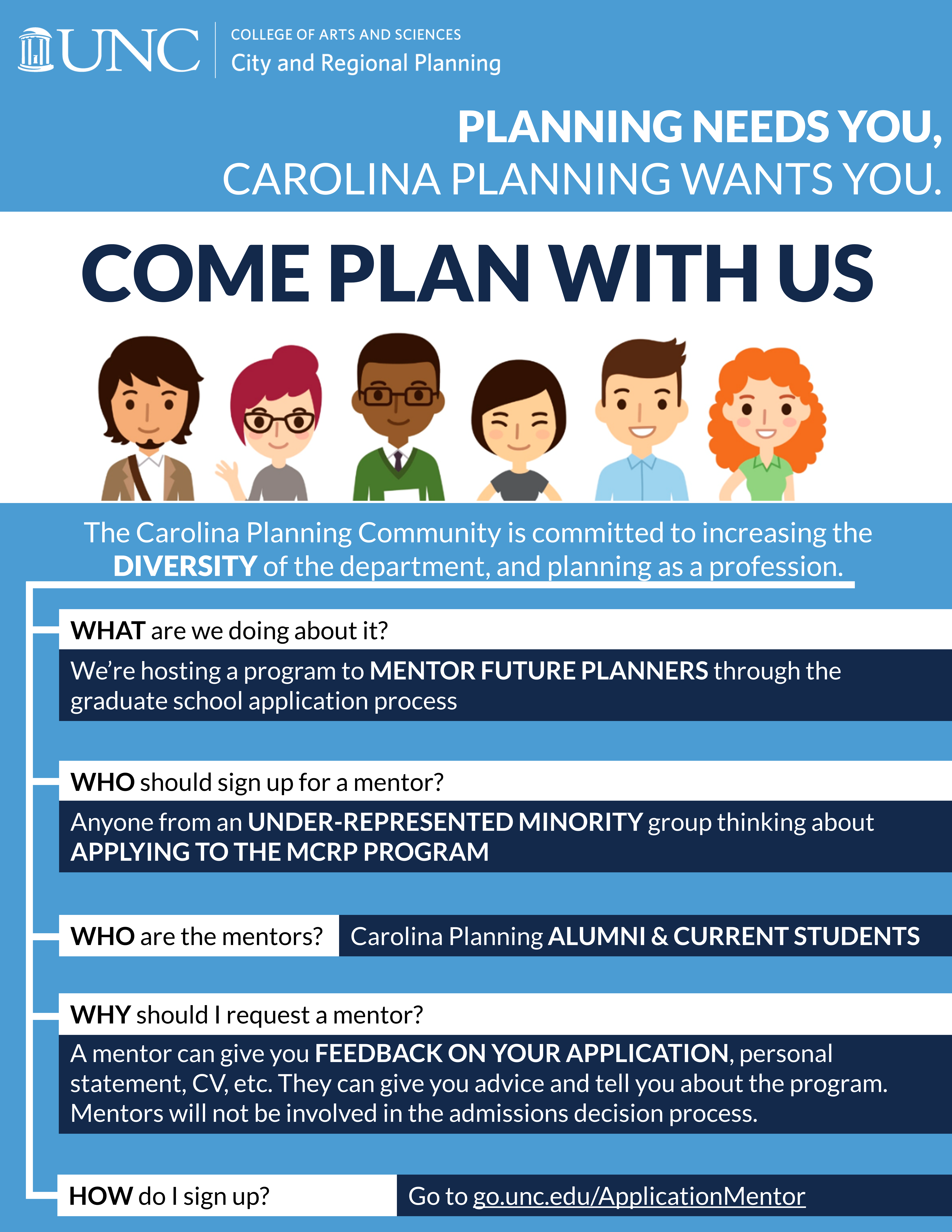Admissions
ICYMI: Admissions Information Session
National Rank – Graduate Planning Programs by Planetizen
Ranked Best Value in American Higher Education by Kiplinger
Post-graduation employment in Planning
WHY CAROLINA?
Come here. Plan anywhere. Carolina Planning is one of the most established and well respected planning programs in the country with an alumni network that spans the globe. Our faculty members, world-class scholars leading cutting-edge research, are redefining the field of planning. And our international student body brings diverse skills and experiences to the classroom, where the low student to faculty ratio allows for high engagement and collaboration.
Read More
Other program highlights:
- Carolina Planning is ranked #5 among Urban and Regional Planning Graduate Programs in the United States.
- Carolina Planning offers dual-degree programs in Business, Public Health, Law, Public Administration, Landscape Architecture, and Environmental Sciences.
- As part of the College of Arts and Sciences, Carolina Planning students have access to interdisciplinary courses across the university.
- Carolina Planning students work with several affiliated institutes, such as the Center for Community Capital, Center for Urban and Regional Studies, Coastal Resilience Center, Development Finance Initiative, and Institute for the Environment.
- We are a PAB-accredited program that upholds the highest standards in planning education.
- UNC-Chapel Hill has been ranked #2 by Kiplinger.com for ten consecutive years as the best value in public higher education.
- Effective for the Fall 2021 application cycle, neither MCRP nor PhD applicants will need to submit GRE scores as part of their application materials.
Chapel Hill is part of the rapidly growing Research Triangle (Raleigh-Durham-Chapel Hill) and offers a high quality of life at an affordable price. The region routinely scores as one of the top 10 best places to live in the U.S. according to U.S. News and World Report.
Meet Our Students
Meet Our Alumni
Jasmine Kumalah Stammes, MCRP ’15
Jasmine is a Healthy Eating and Active Living Coordinator for the Conservation Fund.
Read more >>>Christian Kamrath, MCRP ’18
Christian’s passion for helping communities understand and adapt to climate change impacts made attending Carolina Planning an easy decision. He was especially drawn to the unique opportunity to pursue the Natural Hazards Resilience Certificate, as well as the program’s national
Read more >>>Costs & Funding
Of the top five U.S. planning schools, Carolina Planning has the highest percentage of students who receive funding and the lowest in-state and out-of-state tuition. Plus, the Raleigh-Durham-Chapel Hill area is more affordable than regions with comparable programs.
2023-2024 Tuition
- in-state tuition and fees = $15,534
- out-of-state tuition and fees = $33,826
As a part of the nation’s oldest public university, Carolina Planning has a deep commitment to high-quality education at an affordable price. All admitted applicants are considered for departmental, merit-based funding. Those who apply by the December deadline are also considered for Graduate School funding awards.
All students are eligible to apply for federal student loans through UNC’s Office of Scholarships and Student Aid. Other funding opportunities based on merit, work, diversity, and need are open to students after their first semester on campus. For more information on tuition and fees, contact the Cashier’s office.
Key Dates
ONLINE APPLICATION

PhD Deadline: December 12, 2023
MCRP Deadline: January 9, 2024
DECISION
![]()
PhD: February 2024
MCRP: March 2024
OPEN HOUSE

March 2024
APPLICANTS
Students who care about communities. If you…
- want safer and greener transportation networks.
- want to protect communities from the impacts of climate change.
- want to learn how to create equitable economic growth and provide affordable housing.
- want to shape the future of cities and regions by creating beautiful, sustainable, vibrant, and equitable communities.
Then you belong at Carolina Planning. As a Carolina Planning student, you will be part of a 74-year tradition of training the leading practitioners and academics in the world who are solving these challenges.
Admission to the Graduate School of the University of North Carolina at Chapel Hill and Carolina Planning is highly selective for both the Master’s and PhD programs. Applicants must hold a bachelor’s degree from an accredited college or university.
We want applicants with a clear understanding of the urban planning field; exceptional and relevant leadership; work, volunteer, academic or life experiences; and a commitment to diversity and inclusion. As part of the nation’s oldest public university, Carolina Planning has a strong commitment to accessibility and providing opportunities for students from disadvantaged backgrounds to enter the planning profession. We believe the more reflective of society’s diversity the department is, the better we are.
All application materials should be submitted directly to The Graduate School’s admission portal.
A complete application includes:
- A completed application for admission to The Graduate School
- A supplemental questionnaire
- Unofficial transcripts (official transcripts will be required if offered admission)
- Statement of Purpose
- 3 letters of recommendation
- Curriculum Vita
- $95.00 application fee
- TOEFL or IELTS scores (international applicants only)
- Financial certification (international applicants only)
- [UPDATE: Effective for the Fall 2021 application cycle, MCRP applicants will no longer need to submit GRE scores as part of their application materials.]
The admission committees consider all credentials submitted as part of the application holistically. No single factor is regarded as qualifying or disqualifying. Factors considered in the review of all applications include: grades and academic transcript(s), references, strength of courses and undergraduate institution(s), professional work experience(s), and the Statement of Purpose. The Statement of Purpose should demonstrate comprehension of and commitment to the planning field.
The admissions committee considers all credentials submitted as part of the application holistically. No single factor is regarded as qualifying or disqualifying. Factors considered in the review of all applications include: grades and academic transcript(s), references, strength of courses and undergraduate institution(s), professional work experience(s), and personal statement. The personal statement should demonstrate comprehension of and commitment to the planning field. For PhD applicants, the fit with faculty research interests is important.
All applications for the MCRP program are evaluated by the admissions committee, which is composed of current students. The committee makes recommendations, and the faculty Admissions Director makes the final decisions.
You can view our our 2022 admissions webinar now! We will be hosting one in October 2023 on the 26th. See above for info! You can reach out to us at dcrp-admissions@unc.edu to set up a phone call or meeting in the meantime.
Due to the sequence of courses needed to fulfill our programs’ requirements, the department only accepts admissions applications in the fall for both the Master’s and PhD programs.
The GREs are not required for admissions. International applicants must submit either TOEFL or IELTS scores.
TOEFL Requirements:
- Paper-based test – 550 with a minimum of 50 in each section.
- Internet-based test – a minimum of 90.
IELTS Requirements:
- Minimum IELTS score for international students, 7
There is no required or preferred major in order to be accepted to Carolina Planning. The educational and professional backgrounds of applicants cover a wide variety of academic fields, work experiences and geographic locations. Among them are architecture, biology, business, economics, engineering, biology, geography, geology, history, landscape architecture, philosophy, planning, political science, psychology, public administration, sociology, and urban studies. However, future career goals in the field are considered, no matter what your background is.
If you have questions concerning your application or application procedures, contact us at dcrp-admissions@unc.edu.
Dr. Andrew Whittemore is the Director of Admissions for the MCRP program.
Dr. Todd BenDor is the Director of Admissions for the PhD program.
Admitted Students
Incoming students will be given a program overview by mid-June. Department staff will register incoming Master’s students for core classes before the beginning of the academic year. All incoming students will meet with their advisor during August orientation and can sign up for additional courses and/or make schedule changes then.
The following websites are a good place to start:
Student Housing
Daily Tar Heel (UNC’s student paper)
Apartment Guide





